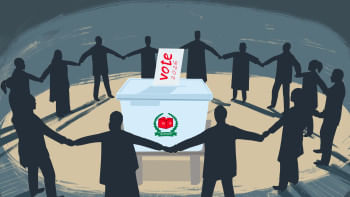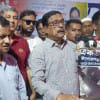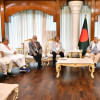Banning an autocrat's words risks strengthening her legacy of fear

When George Orwell wrote Animal Farm, he surely did not know that his allegory would fit Bangladesh so perfectly. But the story of animals who topple one master only to discover their new rulers are no different, captures our political cycles with painful clarity. The slogans change, the faces change, but the instinct for control, particularly control of speech, remains stubbornly the same.
The interim government's recent warning to the media against broadcasting or publicising Sheikh Hasina's speeches is the latest episode in this cycle. To the casual reader, it looks like an administrative step in line with court directives. But for anyone who has lived through the past decade or so, it feels like an old play staged with new actors. Before, it was Tarique Rahman whose words were deemed too dangerous for the public ear. Today it is Sheikh Hasina. The justification shifts, but the script remains unchanged.
The case for the latest prohibition may seem convincing. For over 15 years, Hasina ruled Bangladesh with an iron fist, reducing parliament to a one-party theatre, weaponising the judiciary, and turning law enforcement into her party's private militia. Her hands remain stained with the blood of thousands of innocent citizens. By every meaningful measure, she was an autocrat. Here lies the irony of the speech ban: a leader who for years silenced critical voices by using force now finds herself treated the same way.
It is poetic justice, yes. But it is also a dangerous precedent. The question here is not whether Hasina deserves to be silenced, but whether a government should resort to silencing at all. If the interim authorities want to remind the people of her sins, the way is not to ban her words but to let them flow. The more she speaks, the more her arrogance resurfaces, and the more her irrelevance is exposed. Every speech she delivers is less a threat to the nation than a reminder of the darkness she imposed.
Contrast this with the situation of Tarique Rahman, once treated as a ghost voice under the Awami League government. In 2015, the court ordered his speeches off limits because he was a "fugitive"—the same label is now used against Hasina. For nearly a decade, his voice was muted across television channels and newspapers. But this silencing only magnified his significance to his followers. The interim government must recognise this paradox. If his words could eventually return to the public domain without catastrophe, so could Hasina's. Banning them only elevates her, cloaking her in forbidden importance, and worse, it casts the interim administration in the same mould as the autocrat it replaced.
The claim that Hasina's speeches amount to "hate speech" holds little water. Tyrants often reveal themselves best in their own words. Let her speak, and let the people remember the arrogance with which she dismissed student protests, the disdain with which she treated the opposition, and the authoritarian logic with which she justified enforced disappearances and mass arrests. A government that truly believes in democracy does not fear the words of an ousted autocrat. If Hasina's era was indeed rejected by the people, her speeches will only reinforce why they chose to rise against her.
Silencing her, on the other hand, risks creating martyrdom. Already her statements are circulating on YouTube, Facebook, and WhatsApp. History also teaches us that silencing or censorship never works. Both Bangabandhu and Ziaur Rahman were subjected to attempts at political erasure at different times in our history, but they deepened their symbolic weight eventually. Far from burying their legacies, silence transformed them into larger-than-life figures. The same mistake now risks giving Hasina a stature she does not deserve. Censorship can turn ordinary speeches into forbidden fruit, to be consumed with greater appetite. It also signals insecurity, which the interim government cannot afford to project.
Unfortunately, Bangladesh never seems to learn these lessons. Every regime inherits the tools of suppression from the last and convinces itself that they are necessary for survival. Surveillance, censorship, and repressive policies are rarely dismantled. The Awami League silenced Tarique Rahman; now the interim government silences Sheikh Hasina. Tomorrow, another regime will silence someone else. With each repetition, the principle of free speech—so vital for democracy—risks eroding further.
To break this cycle, the interim government must dare to trust the people. Let all voices—whether popular or poisonous—be heard. Citizens, too, have a big role to play in this, as they must learn to confront lies or provocations without yielding to authoritarian tendencies. The strength of a democracy lies not in silencing words but in confronting them openly, dissecting them, and defeating them with reason. Hasina's autocracy thrived because she feared dissent and muzzled it. The interim government must not follow her path, however tempting it may seem.
In the end, the choice is simple. Bangladesh can continue down the Orwellian path, where each new ruler repeats the sins of the last, and the barn wall is rewritten to justify fresh contradictions. Or it can break the cycle by allowing speeches, even by the people we don't like, to circulate freely. Our decision will determine the kind of democracy we want for ourselves.
H.M. Nazmul Alam is an academic, journalist, and political analyst. He can be reached at [email protected].
Views expressed in this article are the author's own.
Follow The Daily Star Opinion on Facebook for the latest opinions, commentaries, and analyses by experts and professionals. To contribute your article or letter to The Daily Star Opinion, see our guidelines for submission.

 For all latest news, follow The Daily Star's Google News channel.
For all latest news, follow The Daily Star's Google News channel. 










Comments